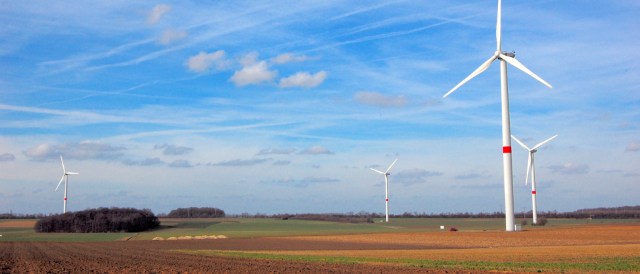In his previous post, Craig Morris tells the tale of Ecopower, a renewable energy co-op and energy provider. Today, he investigates how it takes part in auctions, the quality of which is crucial.

German energy coops fear headwinds from auctions instead of a FiT. In Belgium, auctions already exist – and coops have adapted. (Photo by NguyenDai, CC BY-NC-SA 2.0)
In Germany, energy co-ops and power providers are generally separate entities. Green power providers like Lichtblick and EWS Schönau support co-ops by helping them invest in renewables and by selling green power from these projects to customers. But Germany has done away with the “green power privilege,” which largely exempted such providers of green electricity from the renewables surcharge. We will have to explain that policy change in detail some other time; suffice it to say that power from 100 percent green providers just got more expensive because of the law.
Likewise, German energy co-ops are up in arms about being forced out of feed-in tariffs and into auctions. But German onlookers will be interested to hear that Belgian co-op Ecopower is not afraid of bidding processes. “We compete in them all the time,” says Dirk Vansintjan, member of the board at Ecopower. The quality of the auction is crucial. “When we sit down with local officials, they initially only want to talk about the return for the auctioning authority. But we tell them that we will help them renovate their building stock and analyze other ways of conserving energy, which our corporate competitors do not necessarily do,” he says. (Vansintjan says he also tells co-op members that they consume most of their energy for heat and transport, not as electricity. Co-op members reduce their consumption of power from the grid by 46 percent on average within 8 years.)
Nonetheless, Vansintjan says in an off-the-cuff estimate that Ecopower only wins “around 50 percent” of the auctions the co-op takes part in. “And even then,” he adds, “you don’t necessarily get a permit.”
A low success rate is what worries German co-ops, who recently met in Fulda to discuss the implications of Germany’s new policy. One estimate put the bidding costs at 200,000 to 300,000 euros for a wind farm (report in German) – money that is gone if you lose the auction. Another campaigner in Berlin recently put the figure at 40,000 euros for the first megawatt and around 25,000 euros per megawatt after that. Obviously, bidding processes in Belgium somehow do not entail such heavy risks. But in addition to looking to the West for best practices, Vansintjan says Germans should also look north to Scotland. “They have devised a clever auction system in which the government provides upfront funding for co-ops to take part. If you win, the money is a loan; if you lose, it’s a grant.”
Germany could, of course, set aside funding for co-ops to participate in auctions, but that would require a clear definition of co-ops, which Germany does not have. German solar activist and Eurosolar Prize-winner Erhard Renz recently wrote (in German) about how “Bürgerenergie” (citizen energy, practically synonymous with energy co-ops) is a gray area, especially with conventional utilities now becoming involved.
In addition, Scottish-style grants/loans would require a budget with a specific size – and hence a definition of how much community-owned renewable energy Germany wants to have. (Scotland has a target of 500 MW for community power.) I recently asked Hans-Josef Fell, co-author of the original Renewable Energy Act of 2000, why Germany shouldn’t have a set-aside for co-ops in auctions: “If you use any number below 100 percent, you set a limit, which is unacceptable to the renewables community, and if you set no limit at all, you face resistance from conventional utilities,” Fell answered.
Still, allowing energy co-ops to fail in German energy auctions is the worst option of all. Perhaps German co-ops should not only keep an eye on the success of similar groups in auctions held in other EU countries, but also on Vansintjan himself. He is now touring Europe as President of REScoop.eu, an EU initiative for energy co-ops (see its “best practices” from Ecopower). Soon, he will probably have the best overview of the scene. For nearly 25 years now, Germans have merely needed to understand their own policy. Now, the laypeople involved in energy co-ops need to quickly become experts by gathering best practices from other countries so they can help shape German policy in transition.
Craig Morris (@PPchef) is the lead author of German Energy Transition. He directs Petite Planète and writes every workday for Renewables International.
Ownership by citizens of windfarms is a stable and well known concept. That most people trust.
Citizens that own a family size piece of windfarm, are also owner of the power they generate.
But what lacks in regulations in most countries, is that these owners have the right to use their power at home.
The grid is sort of a public road for electricity.
So citizens that generate power with a property, should be able tot use that power at home. This gives them the cheapest power, and the least need for any type of stimulation. So the lowest of energy, is with direct ownership by citizens.